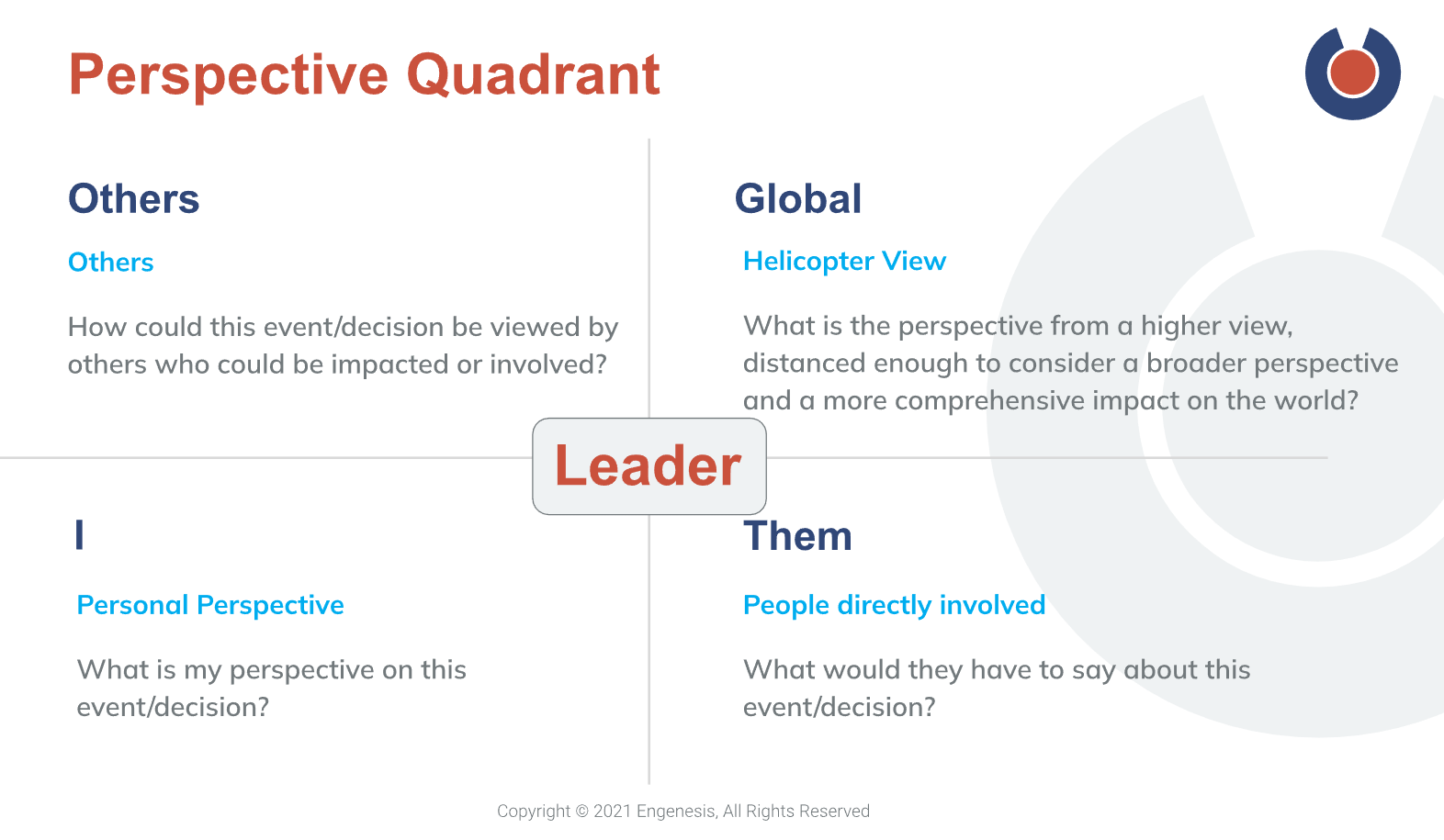As a team leader, what do you do when the teams you manage are stuck in a gridlocked position due to constant conflict and dysfunctional behaviour that undermines collaboration? Is there a way out? In my experience as a leadership coach, this situation is not uncommon. In this article, I share how I overcame team conflict using a simple but highly effective tool called the Perspective Quadrant.
Team managers are often anxious to interfere in team conflict situations and become part of the gridlock because they think they will have to take sides. As they don’t want to end up in the firing line, many avoid the situation and allow things to continue. Alternatively, they do little more than apply gentle pressure on team members to encourage them to become more cooperative. Unfortunately, this strategy simply doesn’t work.
Not knowing how to approach the situation, many managers dance and manoeuvre around team conflict without resolving the underlying issues. This can result in a host of issues, from late project deliveries and missed milestones in the short term to resentment, cynical behaviour and clouded perceptions in the long term. It can also lead to complaints, blaming and shaming. None of this is effective behaviour and can lead to frustration and unnecessary stress for everyone involved.
Over time, teams will often compare themselves to other teams and may start pointing fingers as, when stressed, people tend to look for faults in ‘the other camp’. This can shape perceptions, such as believing the other team is difficult, uncooperative, responding too slowly to requests despite looming deadlines, or deliberately holding back vital project information. But the reality may be far from what these teams have led themselves to believe.
Eventually, opinions and perceptions can feel so real that they become ‘facts’. When conflict gets to this point, it can cause teams to come to a full gridlock in their collaboration efforts, completely halting progress. While a healthy level of conflict is normal in a high-performing team, when conflict doesn’t find resolution but is instead locked at the level of opinionated and righteous behaviour, it becomes counteractive to performance and productivity.
The Perspective Quadrant
In team conflict situations like the one described above, I start with the Perspective Quadrant. The Perspective Quadrant is a tool developed by Ashkan Tashvir, author of best-selling book, BEING, and creator of the Being Framework™, to assist teams in generating greater awareness and support them to view the world through the lens of the other team’s perspective. Seeing the world through another person’s eyes and getting a glimpse of their experience of a situation can open doors to newfound collaboration. It helps teams understand the issues and challenges that other parties face, and develops compassion and true partnership in resolving these issues together.
Let’s have a look at this tool and how it works. As you can see from the diagram below, the four sections of the quadrant correspond with four ways of viewing a situation, event or decision.
The first quadrant views the situation from the perspective of ‘Others’ – people who are not necessarily directly involved but can be, such as the marketing or leadership team. While they may not be directly involved, they are commonly impacted by a hold-up down the line. For example, the marketing team is responsible for a new product launch. Their plans will be impacted if there are delays created by team conflict in product development.
The ‘Global’ view, also called a helicopter view, is a view high or remote enough from the current dispute that it gives you a new perspective on the issue’s significance. It is similar to viewing the ground from a plane or hot air balloon, where objects that are quite large in our daily experience now appear small and less important. It is also an experience astronauts have reported on when in space and looking back towards Earth as it becomes smaller and smaller. They report that this experience of being so remote and seeing Earth for the first time in its totality has radically reshaped their perspective on life and world affairs.
A more personal perspective is the view from the ‘I’ quadrant. Naturally, our own perspective counts and is also a part of the bigger picture.
And then there is the perspective from the other involved parties, or ‘Them’. An example could be the consumer. What is their experience and perspective of the current issue at hand? If a product has been delayed, consumers expecting it may be left frustrated and angry. This is possibly the most confronting aspect to look into but is also a very revealing and necessary perspective to uncover.
There is also a fifth perspective – that of the ‘Leader’. After having viewed all the different perspectives, how would you now, as an authentic leader, assess the situation and make appropriate decisions?
The Perspective Quadrant moves teams from a gridlocked position, a symptom of unresolved conflict and dysfunctional behaviour, to one based on trust and teamwork. This may sound too good to be true, but I have done this many times and can confidently vouch for its effectiveness.
Team conflict case study
In my experience as program director of globally distributed teams, I found myself managing a team conflict situation when I was told to “make the stuck teams collaborate”. There was a lot at stake for the company as we were part of a three-year, make-or-break, global technical program to develop the next generation of software for an already established product. It was an exciting opportunity that also came with a caveat: the teams in Australia and Europe had come to a dysfunctional gridlock in their collaboration and were barely making progress under a fragile façade of teamwork. The program was in jeopardy of failing if we continued on the current trajectory.
Taking the teams through the Perspective Quadrant exercise, I supported them to experience first-hand that both teams had, in essence, very similar concerns. By seeing the issues from various perspectives and openly sharing and addressing their concerns, it was easy to put aside team conflict and reach an agreement. The teams almost outdid each other in the art of compromising! I also learned that I needed to meet the teams with an open and humble attitude as a leader and be the one to listen first, as this type of situation requires a leader to display a healthy level of vulnerability. Furthermore, as I showed genuine interest in resolving the dispute between both teams, I earned their trust.
Solving team conflict is not a one-off event; it is a process. Its successful implementation depends, to a great degree, on sincerity in the follow-up. Together, we developed a plan to improve the communication and collaboration among the teams on an ongoing basis. We integrated new processes and initiatives into our general project planning and ensured they would become part of our ‘DNA’. We dedicated a large portion of our efforts to team bonding, regular communication and developing strong and reliable relationships among the teams.
The program spanned three years and cemented our future in this business, and it wouldn’t have been successful without the collaboration and leverage of these high-performing teams. It turned out to be one of the most rewarding and successful programs under my leadership, thanks to how the Perspective Quadrant shifted the teams’ perspectives and led everything else to fall into place.

